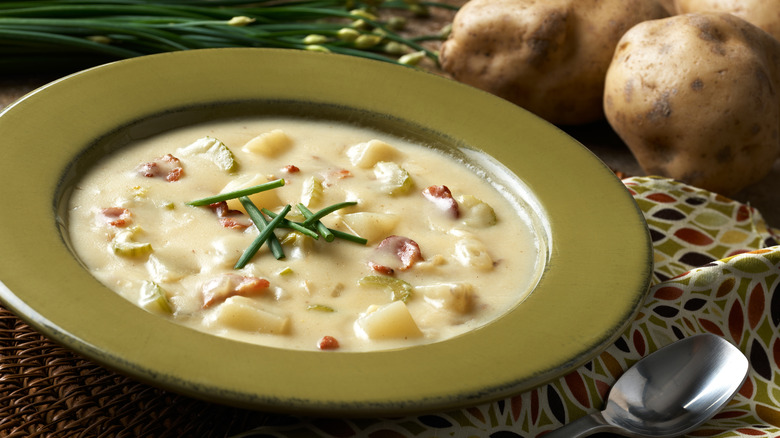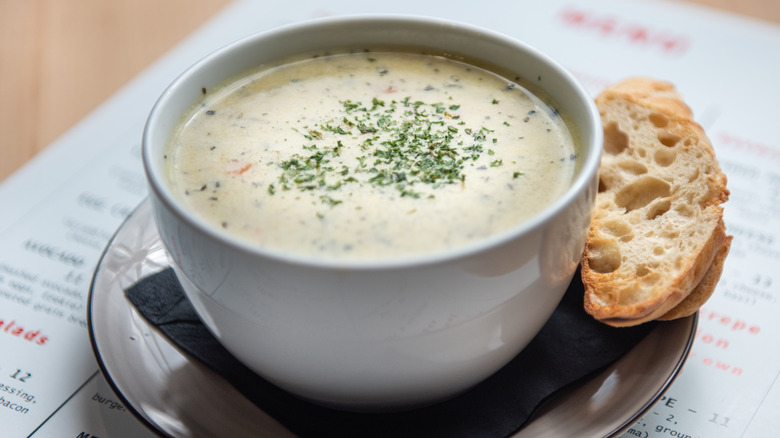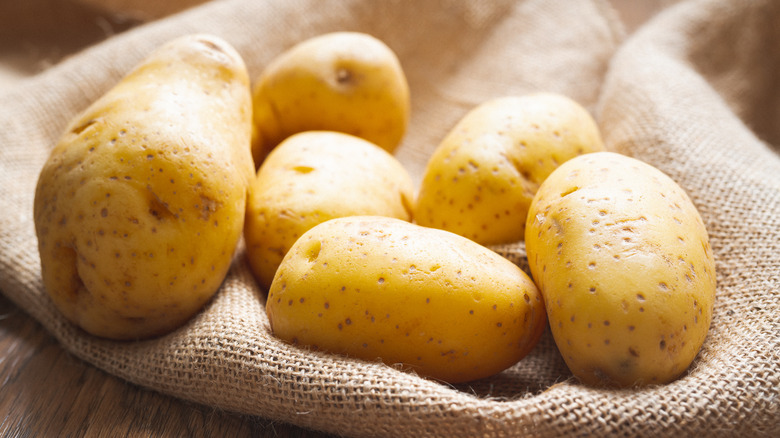How To Prevent Gluey Potato Soup Before It's Too Late
A hot bowl of potato soup makes for the perfect meal on a cold, rainy day. Whether you're making this dish from scratch or using frozen hash browns as a shortcut, the creamy soup packs in a ton of flavors and can be easily customized with toppings such as bacon bits or leeks. While even the most amateur home cook can master potato soup, there is one big pitfall: a gluey texture. You can easily end up with a viscous mess instead of a smooth, creamy soup if you're not careful, and once your soup takes on this texture, it's pretty much too late to save it.
The reason why your soup might be turning gluey or even slimy is that you're overworking your spuds. Potatoes are full of starches, which are complex carbohydrates that easily absorb liquid and turn soft — and eventually goopy — when submerged under hot water. When you blend, mash, or strain potatoes, you release more and more starches from the flesh. After a certain point, this can quickly overwhelm the liquid in your soup recipe, as the starches absorb liquid while turning more and more gluey, gummy, and thick. Therefore, you'll want to keep mashing and blending to a minimum in order to keep your soup smooth.
Sear or roast your potatoes to prevent gummy soup
While you can certainly make potato soup by just chucking potato chunks into a pot of boiling water and going from there, many recipes recommend that you cook your spuds beforehand to maximize your dish's flavor. Searing or roasting your potatoes does more than just add extra flavor to your soup. It can actually prevent your broth from becoming gluey.
When you get your potatoes fired up in the oven or on the stovetop, you expose their starches to the Maillard reaction that creates a nice, darkened crust. This gives the starches a chance to break down without absorbing excess moisture. This results in less starch going into your soup pot, which means you're less likely to end up with overly thick, gluey soup.
While roasting or searing your spuds might require you to dirty up a few more dishes, this extra step should give you more wiggle room when it comes to boiling the soup. Just err on the side of caution and use a light hand when you're blending your spuds into the broth, only mixing just until combined, and you'll end up with a silky-smooth pot of soup. You can ensure even better results by using the right kind of potato.
Use Yukon Gold potatoes for the best soup
Potatoes are one of the most versatile vegetables available on the market. With dozens of varieties found at most grocery stores, it can be quite intimidating to choose one kind over another. Generally, the best kind of potatoes for boiling tend to be waxy variants such as red potatoes or fingerlings, as they have less starches to begin with and hold their shape much better after cooking. However, starchier and fluffier potatoes blend into a soup much more easily.
While some cooks recommend using russets for the incredible amount of starch they can provide to a potato soup, a better choice is Yukon Golds. Yukon Golds are considered to be a more waxy, creamy type of potato, but are a bit more starchy than other waxy types. Since they're neither too starchy nor too waxy, they're often used as "all-purpose" potatoes. While they don't provide the same smoothness as starchier spuds, this all-purpose potato packs in strong, buttery flavors and blends fairly well, without adding too much starch to the soup and risking gluiness.



